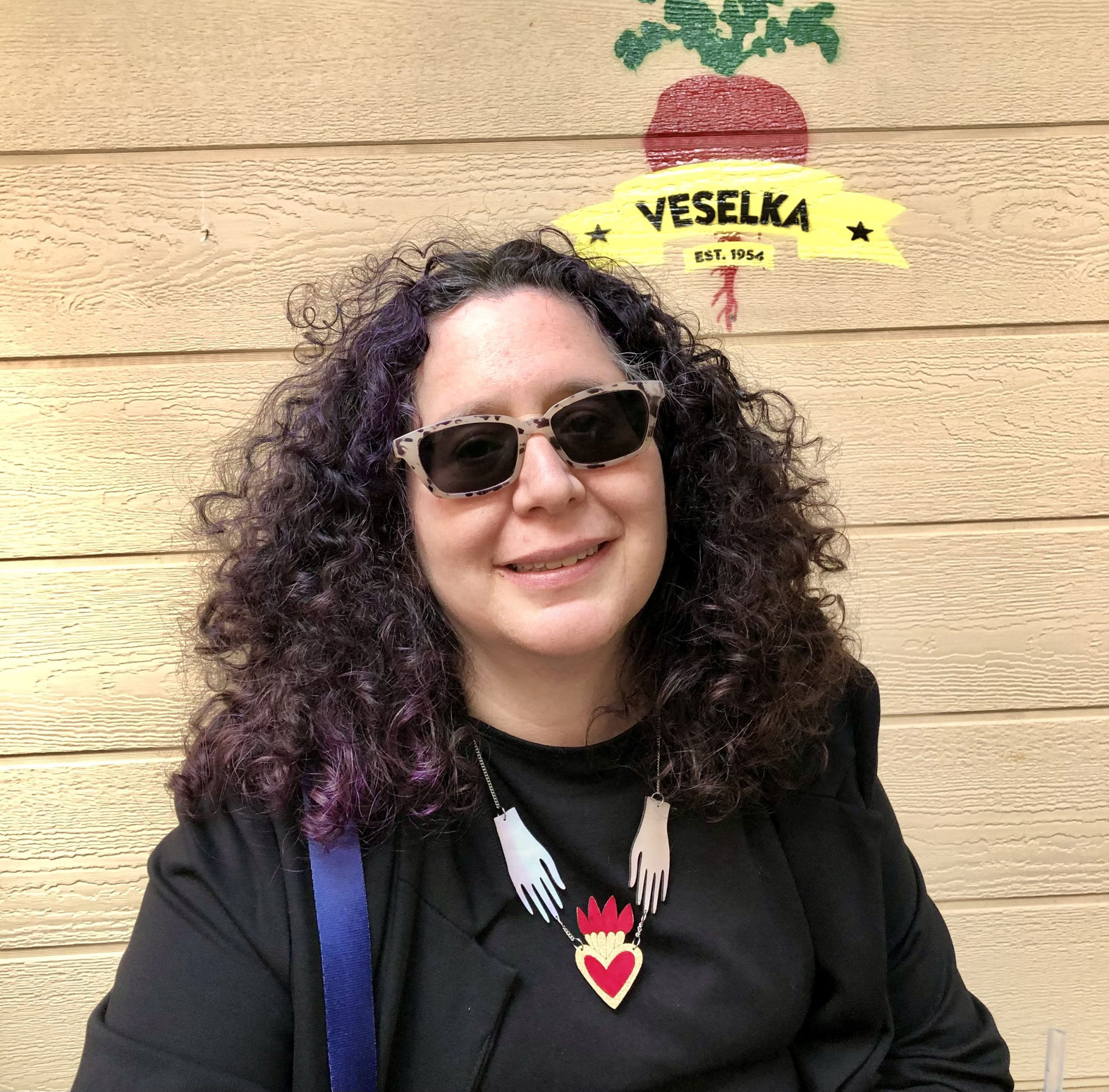 by Jean-Paul Pecqueur
by Jean-Paul Pecqueur
To a New Era
Joanna Fuhrman
Hanging Loose Press
Feeling disillusioned about the lasting appeal of even the most significant of her essays, Susan Sontag wrote, in a diary entry from 1970: “I think I am ready to learn how to write. Think with words, not with ideas.” This thought was the first that came to me after I finished reading To a New Era, Joanna Fuhrman’s most recent collection of poems, her sixth, recently out from Hanging Loose Press.
In “Moveable Us,” Fuhrman provides a quick tutorial for how to think with words: “Pour out the ‘meaning’ in the ‘meaning vessels’/ and press ‘Go.’” Such jumpstarting of the poetry machine, which happens again and again in this volume, allows readers to
wake up in one city
with a different city flowing in our veins.
On these days language is a gold-plated
or mud-crusted hinge on the box of the world.
It is the device which assists objects and events with opening to open into the fullness of their shining, dirty prospects.
How flexible these hinges are is a question underlying many of the poems in this volume. In other words, will the emptied out meaning vessels function smoothly when asked to help open “the box of the world”? The answer to this is an elaborate no, and this is what makes many of the poems in this volume so vulnerable. Here is another moment from “Moveable Us”:
A woman tries radiating dog-eared
quietude. Half-mooned and moody.
She thinks “breakfast,” but the world
hears “steak.” She thinks it’s time to tie
the ribbons on the invisible revolution,
but the world hears “party time,”
thinks “breasts.” What starts as
a “window” ends up as a hole.
“Radiating” as a form of communication is bound to lead to misunderstandings, some of them quite profound, like something one looks through ending up as something one falls into; yet this inevitable inconsistency between what the speaker thinks and what the world hears, between the words themselves and the ideas behind the words—”Listen to What I am Saying, Not What I Say”—is one of the hazards that these poems consistently embrace. It is the in-between that they simultaneously reveal and revel in.
To stretch the thought a bit, consider the multitude of spaces between “fun” and “mental” located in the word “fundamental.” This is just one of the things Fuhrman does in “Are We Having Fun Yet?,” a sestina that uses the words defunded, funnel, funky, malfunction, funicular, and fundamental as the six end-words that the poem works and plays with. But what does it mean to have fun in the context of this poem, where “Every year, our belief in the future is more defunded”? Mostly, it means to funk up language to make room for creation. “We funnel/ the debris to create worlds,” writes Fuhrman in the poem’s fourth stanza, and the glimpses of these new worlds that the poems provide, their views into this New Era, are what excited me most in my reading. They are worlds where, “No longer needing to funnel/ meaning from the objects that malfunction/ we unleash our butterflies into fundamentals …”.
The debris that these poems funnel comes from somewhere, however, from some prior creation. Another reason the New Era Fuhrman writes to in these poems feels so compelling is that its entanglement with those older eras, those of malfunctioning objects, rings so true. In “Muriel Said That to Be a Jew in the 20th Century is to Be Offered a Gift” Fuhrman teases out multiple lines from such an entanglement. Looking backwards to when she was 18, the poem’s speaker provides an anecdote about canvasing for water regulation alongside an activist she had fallen in love with. Even after spending hours in the Texas heat, “clipboard in hand,” she realizes “I never completely believed in the reality of the world, felt more myself in the dissolving boundaries of de Kooning’s blurry yellow.”
This reflection on an earlier engagement with activism provides the reader perspective on what it must have felt like for the speaker when she read The New York Times on Aug. 11, 2017. Here is the poem’s epigraph:
Late Friday night, several hundred torch-bearing men and women marched on the main quadrangle of the University of Virginia’s grounds, shouting ‘You will not replace us,’ and ‘Jews will not replace us.’
“We New York City kids always felt superior,” Fuhrman writes to begin the poem, “but then I wake up and its 2017.” The shock caused by this sudden awakening compels the speaker to interrogate her past:
This is what we thought democracy
looked like: reading poetry in the sandbox,
the ocean removing its rubber mask,
revealing tongue-shaped retractable blades.
In this moment, the speaker is surveying her involvement with history, as one of the “former children/ born to the accidents of privilege.” More specifically, the speaker is grappling with how this history is manifesting in the present, questioning what her social role may yet become. In the poem’s second stanza, Fuhrman writes, in a kind of note-to-self:
Become the anger you envy in other people.
Ignore the paperwork, bills, piles of laundry.
What color is the parachute of an airplane
in flames? Your future career was meant to be
an asteroid or telepathic frog. What happened?
True to the spirit of the poems in the volume, “Muriel Said…” does not pretend to provide an immediate answer to this question. Instead, it sets past and present, history and poetry against one another until the sparks they throw reveal one further facet of the in-between space which comprises the singular content of these poems.
“I love all errors and eras equally,” Fuhrman writes in “I Have a Secret Crush on Everyone in the World,” and after reading this volume I feel compelled to believe her. The poems in To a New Era not only point the reader toward the happy conflation of era and error, history and poetry, making this new indeterminate space appear as a desirable destination; they are simultaneously offered as gifts, as fully realized visions of “the moment between, the arched pause,” that once unwrapped will help bring this New Era to its fullest realization. “Only then,” Fuhrman writes in “Old Weather,” “will you feel like an actual/ part of the world, something more real than just leafy ideas.”
Click to read Liz Axelrod’s interview with Joanna Fuhrman.
JOANNA FUHRMAN (joannafuhrman.com) is the author of six books of poetry, including To a New Era (Hanging Loose Press), The Year of Yellow Butterflies (Hanging Loose Press), and Pageant (Alice James Books). She is a former poetry editor for Ping Pong and Boog City and served as the Monday-night coordinator for the poetry readings at The Poetry Project from 2001 to 2003 and the Wednesday-night coordinator from 2010 to 2011. She currently teaches poetry writing at Rutgers University and coordinates the Introduction to Creative Writing Classes. Elaine Equi photo.

JEAN-PAUL PECQUEUR’s first book, The Case Against Happiness, was published two lifetimes ago by Alice James Books. Two chapbooks, To Embrace Sea Monsters and The Imaginations, have been published a little more recently by Greying Ghost Press and Forklift, Ink., respectively Some even more recent poems have appeared in The Brooklyn Rail. Originally from the Pacific Northwest, Jean-Paul currently teaches composition and creative writing to fine arts students at The Pratt Institute and lives in Bay Ridge, Brooklyn.
(https://brooklynrail.org/2019/04/poetry/from-The-History-of-Modern-Sculpture)

